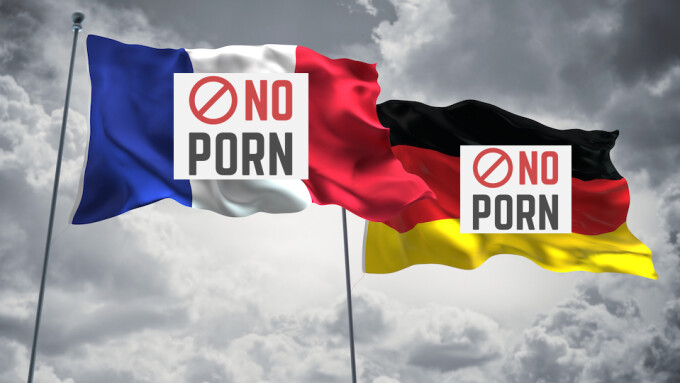PARIS — Prompted by anti-porn activists and politicians, courts in France and Germany moved forward this week with proposed mandates to block adult sites over compliance with controversial age verification mandates.
A Paris court will rule next month on whether French media regulator Arcom “has the right to block access to international porn sites in France unless those sites can guarantee they can prevent minors under 18 from accessing them,” Reuters reported earlier this week. Arcom's action came in response to a complaint by several associations claiming to represent “the children.”
Meanwhile, across the border in Münster, Germany, the Higher Administrative Court has dismissed complaints from Cyprus-based platforms, including xHamster, seeking the reversal of a recent ban by the Düsseldorf Administrative Court.
Both developments — along with a recent reversal of policy by the Conservative government in the U.K., which has now vowed to “crack down” on adult sites like Pornhub and xHamster — are being celebrated by international War on Porn crusaders as stepping stones in a strategy that would culminate in the total banning of adult content by open platforms like Twitter and Reddit.
A Moral Panic on Behalf of 'the Children'
The current French action by so-called “children’s rights” organizations, in alliance with anti-sex-work SWERF activists and extremist Catholic groups, specifically targets tube sites Pornhub, Tukif, xHamster, Xnxx and XVideos.
At a Tuesday hearing, lawyers for the adult sites argued that “the court was not authorized to rule on the case as the law was not in line with the constitution,” Reuters reported.
Arcom told the news service that the court will rule on Oct. 4 as to “whether it can decide on the issue or whether the case needs to go to the appeals court.”
As XBIZ reported, France’s age verification mandate was surreptitiously added to a hastily approved domestic violence law during an atypical and sparsely attended COVID-era session of the French Parliament in July 2020.
The law specifies that adult companies should be required to institute measures beyond simply asking an internet user whether they are of age. It also empowers a government official — the president of Arcom — to demand that the president of the judicial court order ISP providers to immediately block infringing sites in the entire country.
According to French tech journalist Marc Rees, who has been reporting on the developments for news site Next INpact, the tube sites’ appeal is a challenge to the controversial law’s constitutionality, based on the legislators’ vagueness in drafting it, which violates the legal principle of “freedom of expression and communication.”
The German Bureaucrat With a ‘Fetish for Order’ Keeps Moving Ahead
In Germany, the Higher Administrative Court in Münster confirmed the decisions of the Düsseldorf Administrative Court, siding with one-man anti-porn crusade Tobias Schmid, head of the State Media Authority of North Rhine-Westphalia.
As XBIZ reported, Schmid, who has been described as having “a fetish for order,” targeted xHamster as part of his crusade to require age verification for viewing sexual content in Germany.
The obscure local bureaucrat’s efforts led to a court issuing a “network ban” and blocking access to xHamster last March.
The daily newspaper Frankfurter Allgemeine noted at the time that “the network ban is the harshest sanction provided by the German Telemedia Act” and that it is “unpopular and is quickly classified as ‘censorship.’”
“Of course, blocking the network is a dramatic intervention,” Schmid told the paper. “With this offer, however, the right to freedom of expression should not be affected too much. It is simply a business with pornography, and done at the expense of children and young people.”
According to a report by German news station N-TV, the Higher Administrative Court found no constitutional objections to the ban.
“In view of the high priority given to the protection of minors, the providers could not counter the ban with the so-called country of origin principle, according to which internet providers from an EU member state are only subject to the rules there,” N-TV reported this week.






